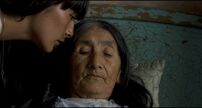What is mourning? What are the goals and tasks of the mourning process? What happened in this process? Mourning is not the same as grief. Grief is an emotion, and mourning is a process. It is a spiritual process of dealing with and digesting loss, separation, separation and grief such as disappointment or failure. In the process, we deal with loss and let it go. In the process we have to experience death symbolically, which is why there are moments of death and numbness. The purpose of the mourning process is to separate yourself and say goodbye. Today's film is a story of grief and mourning, as well as a story of burial and rebirth.
The story takes place in a post-war era in Peru. The protagonist Fasta's mother was raped during the riot, and his father died at the gunpoint of the riot. After the mother experienced severe trauma, she was depressed and unhappy, and got a disease called "sad milk". It was rumored that the disease was hidden in the ground out of fear, and the daughter also got the infection. Instead, people can't avoid mothers and daughters. With her tactful singing, my mother closed her eyes and told her suffering and fear. In singing over and over again, her life came to an end. Fasta walked out of the room indifferently, and passed out before the tears flowed. In the hospital, the doctor told his uncle that there was a potato in Fasta's body, which caused inflammation of the uterus. The uncle insisted that Fasta was infected with "sad milk" by his mother, not a potato. On the way home, Fasta kept telling her uncle that this was the only way to avoid being raped during the war, and she stuck to the potatoes. Her uncle interrupted her and told her that no one would hurt her in Lima and that your mother was dead. Fasta was silent. Still in the face of fear, Fasta sings her mother's song "Hide the fear, pretend they don't exist...", lying on her dead mother's shoulder, stroking her mother's hair. Still withdrawn, silent, indifferent to everything, avoiding all communication of the opposite sex. In her world, there are only mother's warnings while walking against the wall, mother's suffering and mother's fear and singing, in Fasta's ears, those sad tunes whispering her mother's thoughts, Fasta talks to They are together. Fasta was determined to bring her mother back to the village. For this reason, Fasta decided to go to Mrs. Aida's house alone to be a servant. There is a high door between Mrs. Aida's house and the outside world. Here, Fasta sees a different world, which makes her nosebleed with fear. She runs away and sings her mother's song, "Hide the fear, as if they don't exist...". When the beautiful piano arrived, she carefully removed the cover of the new piano, secretly opened the cover and quickly closed it and ran away. Once, when Mrs. Aida heard Fasta's singing, she offered to exchange pearls. She wanted to sing but found that she opened her mouth and couldn't. One day, Mrs. Aida's gardener came, she timidly opened the door, and quickly walked into the house, like the other opposite sex that she couldn't look at, she didn't dare to look at the gardener, she didn't dare to speak, just like she faced the unknown world. The gardener's gentle personality makes Fasta relax. He seems to understand why Fasta only chooses daisies, and he accompanies her at a comfortable distance from Fasta.
At one chance, the gardener offered to take her home, and Fasta carefully kept a distance from him, telling the tragic experience of her mother and brother. The roof saw the back of the gardener leaving, and there was a smile on his face that he had never had before. Fasta began to change slowly. She was able to sing her mother's songs to Mrs. Aida and replace them with pearls. The song she sang also began to change, "Mama made you born in the fire of war, and let fear be with you, even if they hurt you, don't cry, don't bear the pain, go search, go search, your lost soul, Looking for in the dark, in the soil..." In addition to the numbness and fear, her feelings slowly appeared desire and warmth, and she was melted little by little. One day the gardener brought a gift to Fasta. She wiped the sweat from her palms and timidly stretched out her hand, which was a handful of colorful candies. The moment she saw it, she ran away in fear, and the candy was scattered all over the place. She quarreled with the gardener angrily. She thought it was the gardener who angered her, but the gardener said that death was inevitable. Fasta still regularly sheds the sprouts that sprout the potatoes out of their bodies and still gets excruciating pain. She ran away again and again between taking it and not taking it. She was confused. As soon as she could get all the pearls, the performer Mrs. Aida played Fasta's tune on the stage, and when the familiar tune played, it penetrated her numb heart In the dark aisle, she looked towards the outside world. The moment she saw the stage, her eyes also had light. After the performance, Mrs. Aida drove her out of the car halfway because of her guilty conscience. She got out of the car in a daze, and when the car drove away, when she had to face the world alone, her emotions finally broke out and cried on the road.
She stole the pearl that belonged to her, clenched it tightly, and walked out in a daze. The moment she stepped out of the door, she fainted again on the road, her shoulder strap slipped, revealing her "sad" breast. The gardener came to her, helped her get dressed, and helped her up. Fasta saw the gardener and hugged him tightly. For the first time since her mother died, she cried and begged the gardener to help her take out the potatoes. The mother she can no longer protect, who is accompanied by pain and suffering all the time, she wants to leave them.
The potato was taken out, she looked at the pearl in her hand, and said nothing. That was what she wanted. She carried her mother back to the village, just like her mother carried her when she was a child, and sang the story of the mermaid that was played before facing the sea.
Soon after, she received a pot of flowers. Under the small yellow flowers, there were two potatoes at the bare roots. She smiled and smelled the fragrance of the flowers, and there was no more anxiety in her eyes. "Sad Milk", potatoes and singing, carry the mother's nourishment and protection, and also carry the mother's sadness and fear after the trauma. They made her hostile to the opposite sex and unable to accept confessions. It is a symbol of the fusion of mother and daughter. When her mother died, she kept her mother's body and lay with her mother, as if her mother was never different. She buried her soul in the soil with her mother and experienced grief together. This feeling What hinders her independence is a web between her and the outside world. She cannot communicate with other people. When the pearls and candies she wants appear, she is scared away. She cannot enjoy the beauty of life. castrated. When the gardener saw her heart, kept her safe, understood her, accompanied her, and gave her the fatherly support she had never had before, she saw a world different from her mother's world, and the outside world gave her Her strength, when the strength is enough, she will replace the daisy, she will exchange the song for the pearl, she has the courage to steal the pearl, to win the favorite thing. Facing her mother's death, Fasta went from being numb at the beginning, to her collapse when she went home alone, to taking out the potatoes, burying her mother, and completing the mourning of her mother's departure. Her life was full of vitality, and she was no longer depressed and avoided feelings. Her pearl, the blossoming potato sprout symbolizes the transformational completion of the relationship between her and her mother. Growth is burial after burial, and life is a flower that grows in the place where it has been buried. May everyone be accompanied by love on the road of life.
View more about La teta asustada reviews









